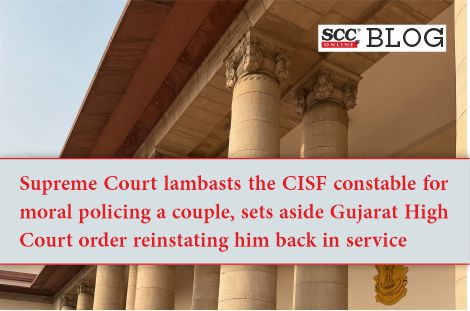Supreme Court: In an appeal preferred by the Central Industrial Security Force (‘CISF’), division bench of Sanjiv Khanna and J.K. Maheshwari, JJ., has set aside the order of the Gujarat High Court which had allowed the reinstatement in service of the CISF constable/Respondent with 50% back wages from the date of his removal and consequently upheld the order of removal from service passed by the disciplinary authority.
Background
The constable was charge-sheeted on allegation of misconduct while he was posted at the Greenbelt Area of the IPCL Township, Vadodara, Gujarat after considering the report of the Inquiry Officer.
The respondent on the pretext of questioning the complainant accompanied with his fiancée, stopped and took advantage of them in the night when they had gone to play garba, by stating his desire to spend some time with his fiancée. On protest, the complainant was coerced into handing over his watch to the respondent.
Following the incident, the very next day, the complainant filed a written complaint against the respondent in consequence to which the watch was returned and the complaint was withdrawn.
Subsequently, the disciplinary authority agreed with the inquiry report and penalised the respondent by way of his removal from service.
Both the appeal as well as the revision petition preferred by the respondent were rejected which was again challenged vide Special Civil Application, whereby the Gujarat High Court while allowing the writ petition stated that the entire case was resting on sole testimony of the complainant whose evidence was inconsistent and the credibility of his fiancée’s statement was also in question.
Court Analysis and Findings
The Court said that the oscillating deposition made by the witness on behalf of the respondent was fabricated. As far the statement made by the fiancée was concerned, the Court took note of the fact that she was asked to step away at some distance while the complainant and the respondent argued and stated that “We would not read her statement as exonerating, or even contradicting to the version given by the complainant. She was a young girl, and it is obvious would have felt anxious and awkward. It is understandable as she would not have liked being subjected to personal and private questions. These are facts of life that have to be accounted for when we evaluate and pass judgments.”
The Court further went on to state that the letter to withdraw the complaint made by the complainant will not nullify or exonerate the charges against the respondent and that the order of the Gujarat High Court only partially recorded and referred to the facts stated by the complainant and does not refer to the background vis-à-vis respondent’s demand to spend time with the fiancée which was clearly stated by the complainant and was also recorded in the High Court’s order.
The Court expressed its reservations regarding the reasons stated by the Gujarat High Court while allowing the reinstatement of the respondent as it failed to apply the law of judicial review.
The Court reiterated the Wednesbury principles while referring to Central Industrial Security Force v. Abrar Ali, (2017) 4 SCC 507 which held that “Judicial review is not akin to adjudication of the case on merits, and adequacy or inadequacy of evidence, unless the court finds that the findings recorded are based on no evidence, perverse or are legally untenable in the sense that it fails to pass the muster of the Wednesbury principles.”
The Court then referred to Union of India and Others v. P. Gunasekaran, (2015) 2 SCC 610 and which had held that the “Power of the High Court under Articles 226 and 227 of the Constitution of India enables exercise of judicial review to correct errors of law, including procedural law, leading to manifest injustice or violation of principles of fairness, without normally venturing into reappreciation of evidence.”
The Court in its concluding statement asserts that there was an apparent error of law in the order passed by the Gujarat High Court as the writ court is primarily concerned with examination of the decision-making process when a disciplinary action is challenged. It requires satisfaction that the competent authorities have held inquiry as per the prescribed procedure and have duly applied their mind to the evidence and material placed on record, without extraneous matters being given undue consideration, and the relevant factors have been cogitated.
“The respondent is not a police officer, and even police officers are not required to do moral policing, ask for physical favour or material goods, observed The Supreme Court and accordingly set aside the Gujarat High Court order while upholding the order of removal from service passed by the disciplinary authority.
[CISF v. Santosh Kumar Pandey, 2022 SCC OnLine SC 1734, decided on 16-12-2022]
*Judgment by Justice Sanjiv Khanna.
Advocates who appeared in this case :
For the Petitioner- Advocate B.V. Balaram Das;
For the Respondent- Advocate Rakesh Uttamchandra Upadhyay.






